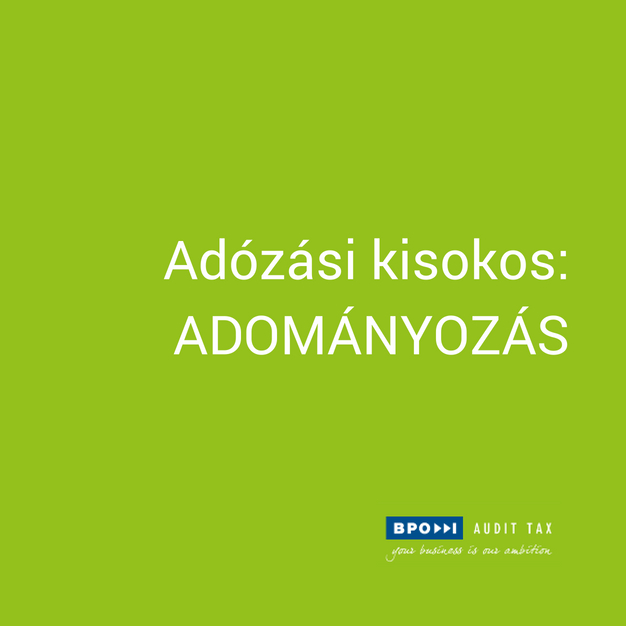
However, it is useful to clear up taxation issuers, i.e. how we proceed correctly when giving donations, and in what cases, under what conditions, what value this reduction can be for donor companies.
Before studying the issue, let’s consider what constitutes a donation. Any gift, money or any other financial assistance that is given or received without consideration as a grant, for charitable or non-profit purposes is considered as a donation. This can be a one-off or a long-term donation.
Long-term donation
Long-term donation is a grant based on an agreement concluded between the donor and the receiver. In the long-term donation agreement, the donor undertakes to provide the donation
- in the year when the agreement was concluded (or amended) and at least for three subsequent years
- at least once a year
- in the same or increasing amount
- without consideration
It is not considered to be a consideration if a public-benefit organization refers to the donor’s name and activity in the context of its public service provision.
To whom and for what purpose can donation be given?
- to public-benefit organizations to support their statutory public benefit activities
- to ecclesiastical legal entities to support their statutory activities
- to organizers of public commitments for a public commitment
The donation can always be given only in the relevant tax year without any repayment obligation, in the following forms:
- grant
- support
- asset provided without consideration or compensation (value: the book value of the asset)
- services provided free of charge (value: direct cost of the service)
What are the conditions for a donation?
The donation does not result, in addition to those set out in the Act on Corporate Tax and Dividend Tax, in any financial advantage for the donor, its members (shareholders), its executive officers, any member of its board of directors or board of supervisors, its auditor, or close relatives of such persons or natural person members (shareholders) (with the proviso that any reference made to the name or to the activities of the donor shall not be regarded as financial advantage).
Pursuant to Subsections (1) and (6) of the Act on Corporate Tax and Dividend Tax,
- 20 per cent of the support or grant if provided to a public-benefit organization for supporting their activities in any form: financial support, assets, services or
- 40 per cent if provided under a long-term donation agreement
shall be deducted from the pre-tax profit.
50 per cent of the direct cost of the support, grant, asset or service if provided to the Magyar Kármentő Alap (Hungarian Fund for Clean-up and Salvage), the Nemzeti Kulturális Alap (National Cultural Fund), the Kárenyhítési Alap (Agricultural Compensation Fund) on a voluntary basis, without statutory obligation, or to higher education institutions under higher education support agreement, up to the amount of the pre-tax profit on the aggregate.
Taxpayers may reduce their pre-tax profit only in possession of a certificate made out for tax purposes by the public-benefit organization or the Magyar Kármentő Alap (Hungarian Fund for Clean-up and Salvage), Nemzeti Kulturális Alap (National Cultural Fund) or the higher education institution.
The amount of the donation, along with the deduction above, is recognized at the tax base, i.e. the pre-tax profit shall not be increased by this amount if the donor possesses a certificate made out by the organization receiving the donation for establishing the tax base.
If the donation is not in cash, the direct cost of the service provided or the book value of the delivered product should be taken into account and indicated. The certificate shall be issued to the donor until the end of the tax year at the latest.
If you would also like to be a donor, the following link may help you search for organizations.
https://adjukossze.hu/kereses/szervezet



